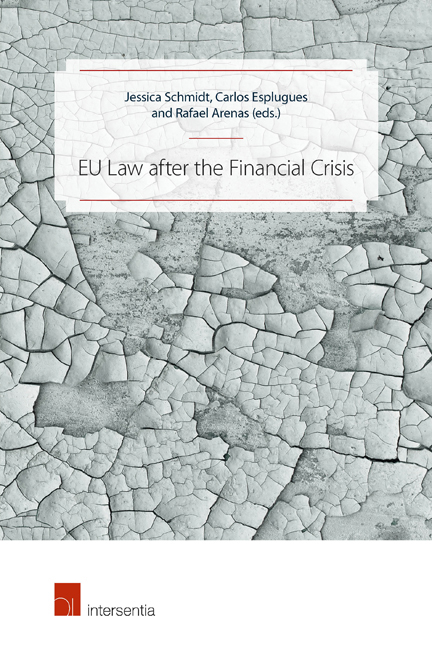Book contents
- Frontmatter
- Contents
- List of Abbreviations
- List of Authors
- Introduction
- PART I RESCUE MECHANISMS AND MONETARY POLICY
- PART II THE IMPACT OF THE FINANCIAL CRISIS ON THE BANKING SECTOR AND CAPITAL MARKETS
- PART III THE FINANCIAL CRISIS AND TAX LAW
- PART IV THE FINANCIAL CRISIS, CONSUMERS AND CONSUMER LAW
- Is European Private Law Going Through a Crisis? The Current Situation of European Private Law after the Financial Crisis
- Financial Crisis and General Contract Law
- Stress-Testing EU Law in the Field of Consumer Redress
- Stress Testing of European Law of Consumer Jurisdiction. Coherence of the Existing Rules and their Impact on the Level of Consumer Protection
- PART V THE FINANCIAL CRISIS AND COMPETITION LAW
- PART VI THE FINANCIAL CRISIS, RESTRUCTURING AND INSOLVENCY LAW
- PART VII THE SOCIAL DIMENSION OF THE FINANCIAL CRISIS AND EU CITIZENSHIP
- PART VIII REFLECTIONS ON THE IMPACT OF THE FINANCIAL CRISIS ON THE GENERAL EUROPEAN LEGAL FRAMEWORK AND THE FUNDAMENTAL “EUROPEAN IDEA”
Stress-Testing EU Law in the Field of Consumer Redress
from PART IV - THE FINANCIAL CRISIS, CONSUMERS AND CONSUMER LAW
Published online by Cambridge University Press: 13 December 2017
- Frontmatter
- Contents
- List of Abbreviations
- List of Authors
- Introduction
- PART I RESCUE MECHANISMS AND MONETARY POLICY
- PART II THE IMPACT OF THE FINANCIAL CRISIS ON THE BANKING SECTOR AND CAPITAL MARKETS
- PART III THE FINANCIAL CRISIS AND TAX LAW
- PART IV THE FINANCIAL CRISIS, CONSUMERS AND CONSUMER LAW
- Is European Private Law Going Through a Crisis? The Current Situation of European Private Law after the Financial Crisis
- Financial Crisis and General Contract Law
- Stress-Testing EU Law in the Field of Consumer Redress
- Stress Testing of European Law of Consumer Jurisdiction. Coherence of the Existing Rules and their Impact on the Level of Consumer Protection
- PART V THE FINANCIAL CRISIS AND COMPETITION LAW
- PART VI THE FINANCIAL CRISIS, RESTRUCTURING AND INSOLVENCY LAW
- PART VII THE SOCIAL DIMENSION OF THE FINANCIAL CRISIS AND EU CITIZENSHIP
- PART VIII REFLECTIONS ON THE IMPACT OF THE FINANCIAL CRISIS ON THE GENERAL EUROPEAN LEGAL FRAMEWORK AND THE FUNDAMENTAL “EUROPEAN IDEA”
Summary
INTRODUCTION
European consumers have access to diverse and alternative redress systems to solve their complaints in relation to cross-border complaints. Those alternatives refer to judicial and non-judicial (i.e. conciliation, mediation or arbitration) schemes, available for individual as well as for collective claims. However, the existing disparities between Member States in relation to those dispute resolution systems create difficulties to access justice and, as a result, European consumers refrain from shopping across borders, thus negatively affecting the development of the internal market. This outcome is especially negative in the current economic framework of financial crisis. Therefore, this chapter aims to provide an overview of the “market” of redress systems available for cross-border consumer complaints in the EU by assessing the alternatives open to consumers in the Directive on Consumer ADR and the Regulation on Consumer ODR, as well as their impact in enhancing the confidence of consumers in the internal market.
FINANCIAL CRISIS AND JUSTICE TO CONSUMERS IN THE INTERNAL MARKET
The current economic and financial crisis has increased the need to stimulate the internal market, in order to achieve the main goals of the EU. In that respect, European institutions have underlined that there are several disparities and difficulties, in terms of access to justice for consumers redress in cross-border cases, which constitutes a barrier to the internal market and leads to its fragmentation. As a result, and according to such analysis, consumers normally abstain from shopping across borders and also lack confidence that potential disputes with traders can be resolved in an efficient, easy, fast and inexpensive way, thus negatively affecting the proper functioning of the internal market.
In relation to this, and if we take into account the different alternatives open to consumers to solve their disputes when these disputes are of a transboundary nature, it is legitimate to analyse which redress mechanisms are better tailored to satisfy consumers’ needs in relation to intra-European situations, in order to improve access to justice for consumers in the EU, increase cross-border shopping and, as a result and ultimately, enhance their confidence in the internal market.
- Type
- Chapter
- Information
- EU Law after the Financial Crisis , pp. 133 - 146Publisher: IntersentiaPrint publication year: 2016



